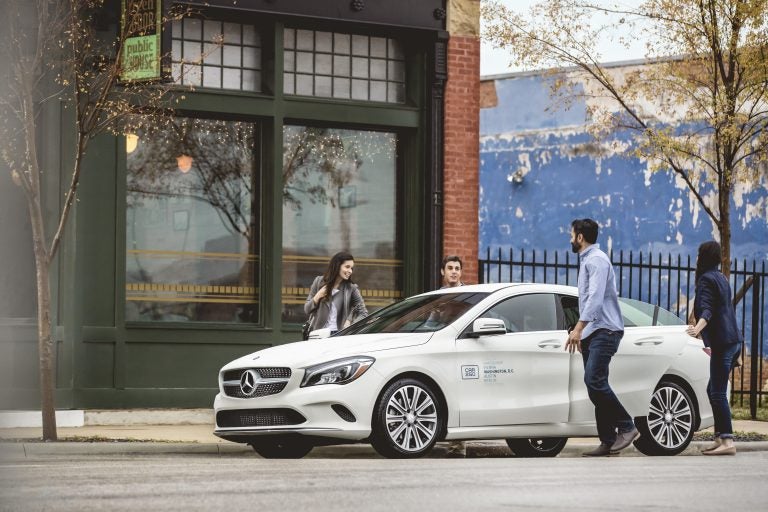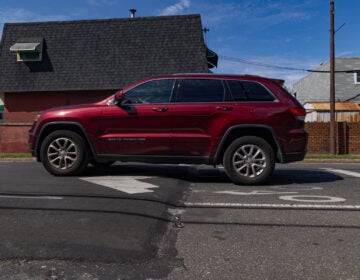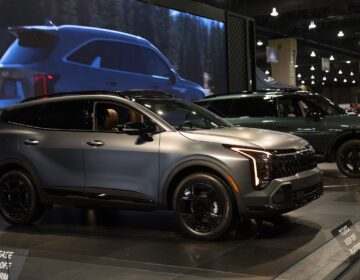New ‘park anywhere’ car-sharing service vying for a spot on Philly’s jammed streets
After months of lobbying, a German company could be on the cusp of making a new method of car sharing legal in Philadelphia.

(Car2go)
This article originally appeared on PlanPhilly.
—
After months of lobbying, a German company could be on the cusp of making a new method of car sharing legal in Philadelphia.
The company, operated by the Stuttgart-based corporation Daimler AG –– manufacturer of Mercedes-Benz automobiles –– provides a service similar to Zipcar and other car-sharing businesses. But instead of leasing designated spaces on the street, in garages or lots for customers to park cars after use, the Daimler subsidiary known as Share Now allows drivers to leave vehicles at any legal on-street parking space within a given jurisdiction.
The model resembles dockless bike sharing in that it allows motorists a way to return vehicles on the go, without requiring any special stops. Daimler markets the service as the “park anywhere” option.
Councilman Mark Squilla and Council President Darrell Clarke introduced a bill Thursday that would authorize “flexible-park auto sharing organizations” to make regular payments per vehicle to the Philadelphia Parking Authority. These “meter revenue offset fees” would cover the cost of parking its fleet of vehicles in public lanes. The bill would allow the company to roll out hundreds of vehicles — a minimum of 300 and a max of 500. After a two-year pilot period, the city expects to invite up to two other “flexible-park” car sharing companies to enter the city.
The legislation establishes an initital service area where cars could park. The zone covers Greater Center City, parts of West Philly, the River Wards and South Philly, including the Navy Yard. It also allows for the exclusion of certain streets within the designated zones, based on the “availability of parking” or if a business owner complains.
The new vehicles would compete with Philadelphia drivers as well as the ever-growing number of car-hailing vehicles and delivery trucks jockeying for a limited amount of curb space. Some 36 million Uber and Lyft trips originated in Philadelphia between July 2017 and June, according to PPA data reported by The Philadelphia Inquirer.
But Christopher M. Puchalsky, director of policy at the city’s Office of Transportation, Infrastructure, and Sustainability said that research has shown that the flexible-parking model of car sharing reduced overall vehicle ownership.
“When households participate they usually give up about half of their cars. It’s usually someone going from one car to zero cars or a household going from two cars to one car,” he said. “That’s why we’re doing this. It’s shown to make the parking situation better in cities.”
Operational in 20 European cities, the company formerly known as Car2go recently expanded to Asian and North American locations, including New York, Chicago, Vancouver and Austin, home to its North American headquarters.
The company will pay PPA $500 per vehicle to offset foregone meter revenue for the first year. After that initial period, the fees will be reassessed based on data reflecting how much time the cars spend parked in metered spots. The bill specifies that no vehicle can sit on any given block for more than 48 consecutive hours, and that cars can’t violate parking regulations.
Lobbying records show the Daimler subsidiary poured nearly $90,000 into wooing City Council over the past year. “(We) are considering entry into a number of markets worldwide, one of which is Philadelphia,” said Share Now spokesperson Kendall Kelton in an email acknowledgment of the company’s interest in the Philadelphia market.
Kelly Cofrancisco, a spokesperson for the city, said officials have met with the company about plans to bring its cars to Philly. Even though the company will be bringing more gas-guzzlers to vie for space on Philly’s crowded streets, its service could be a means to reduce vehicle ownership in the aggregate, she said.
“Our goal would be to allow the PPA to continue to collect fees for on-street parking while helping to reduce the number of cars owned by individuals – thereby reducing the number of cars and congestion,” she said, echoing Puchalsky.
WHYY is your source for fact-based, in-depth journalism and information. As a nonprofit organization, we rely on financial support from readers like you. Please give today.







